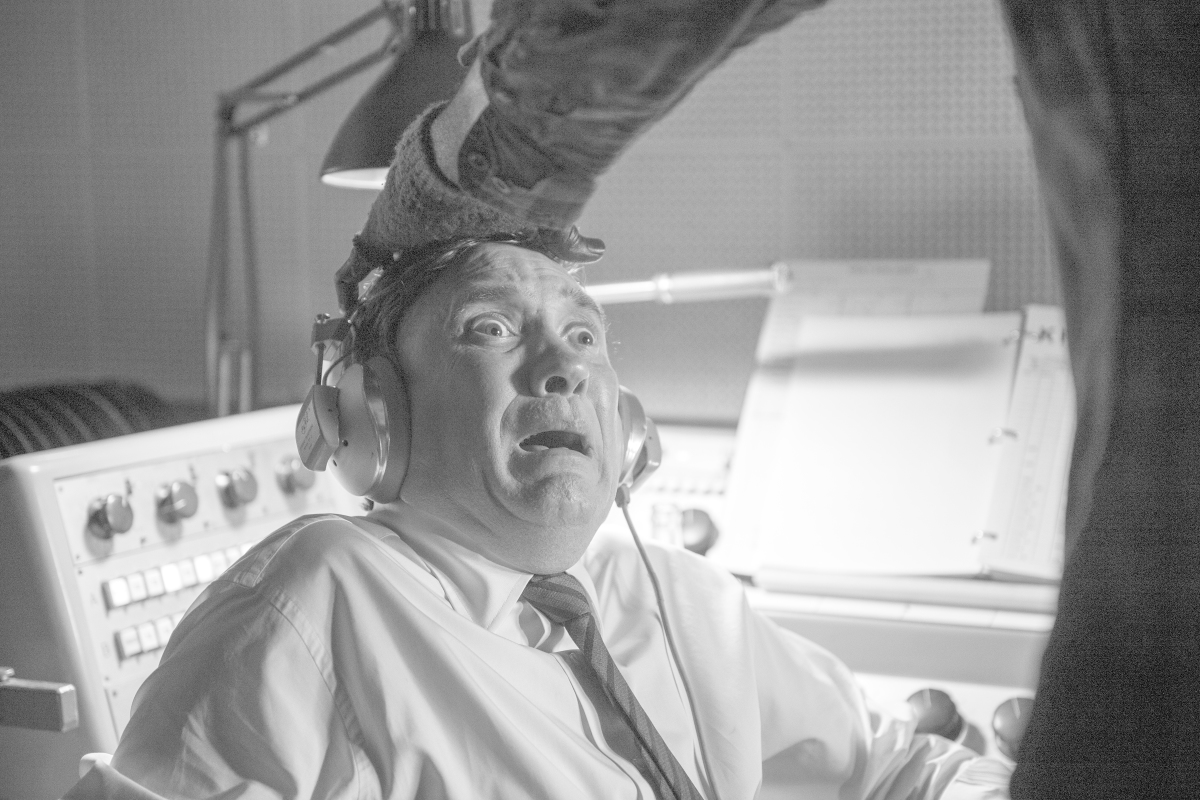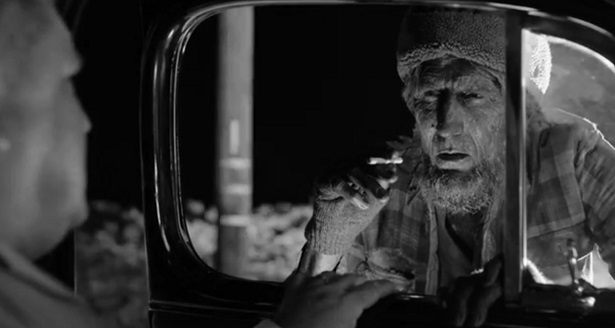Let's talk about the crazy score of the new Twin Peaks
The revival sounds very different from the original. Here's why.


A free daily email with the biggest news stories of the day – and the best features from TheWeek.com
You are now subscribed
Your newsletter sign-up was successful
The latest episode of Showtime's revival of Twin Peaks was the Black Lodge of TV. Part eight begins normally enough (for an episode of David Lynch's oddest and longest-running creation, anyway), but it evolves into something closer to an experimental film — a kind of innocence-smashing mash-up of Terence Malick's Tree of Life, Kubrick's 2001: A Space Odyssey, film noir, sci-fi, nostalgic Americana, and — most importantly — fear. Or garmonbozia, to steal a term from the show — the pain and sorrow spirit-villains consume like creamed corn.
Nobody knows what to make of part eight — me especially! — so let's talk about the music. Specifically, about the episode's use of Penderecki's Threnody to the Victims of Hiroshima. Lynch used Threnody to score a long sequence in which the camera zooms into the mushroom cloud of the July 16, 1945, Trinity nuclear test. It's a little on the nose, as these things go — a piece dedicated to the victims of the atomic bomb scoring footage of the first atomic bomb.
But that piece has an interesting footnote: It wasn't always called that. Threnody — a tremendous piece whose wildly experimental score you can watch being performed here — was initially titled 8'37" (like John Cage's 4'33"). Only later did Penderecki title it in a way that tied it to mourning and the atomic bomb (the humanitarian associations led UNESCO to award him a prize). That's noteworthy, I think: A piece composed as a sonoristic soundscape without anything like a plot in mind eventually acquired one. The piece got retconned into program music. That may or may not change your reading of Threnody — but since a threnody is a lament, a form of musical mourning, learning that it wasn't composed with any victims in mind does change my sense of it just a bit. So: Why did he rename it?
The Week
Escape your echo chamber. Get the facts behind the news, plus analysis from multiple perspectives.

Sign up for The Week's Free Newsletters
From our morning news briefing to a weekly Good News Newsletter, get the best of The Week delivered directly to your inbox.
From our morning news briefing to a weekly Good News Newsletter, get the best of The Week delivered directly to your inbox.
''Oh, I don't know,'' Mr. Penderecki said, but added, after a moment of sheepish silence, ''You know in those days we were surrounded with all this propaganda about the American bomb.'' [The New York Times]
I wonder if Lynch would give a similar answer to the upcycling stakes in Twin Peaks. There's something hilariously disproportionate about a sequence that puts Laura Palmer's floating head in symbolic conversation with an atomic bomb that killed some 150,000 people.
The more I thought about Penderecki (and that funny little retitling move), the more I find useful points of resemblance between the two experimentalists. Like Lynch, who acts in and directs Twin Peaks, Penderecki strongly preferred to conduct his work in order to render his artistic vision. Where Lynch's scripts and direction can elicit extremely idiosyncratic performances, Penderecki invents new forms of musical notation that give the performers some improvisational freedom within very strict and strange parameters. "In my own works I am an obsessionist," Penderecki said once. "Though I write humorous music too, much of it has been obsessed by death and the tragic." Lynch could say much the same. And, like Lynch, who used Twin Peaks to both subvert and indulge the conventions of soap opera, Penderecki found himself reworking familiar genres: His "St. Luke Passion" and "Dies Irae" don't bear an obvious relation to Bach or Orsini.
That said, Twin Peaks used to be a lot less formally experimental. It was a much more indulgent show. Characters would have dreams, but then they'd narrate them so we'd understand exactly what happened. The music was playful and sometimes sexy; a lot of it was there to make you feel, well, good. It's a treat to hear Angelo Badalamenti talk about how he came up with the Twin Peaks theme because the process is so damn sweet. "Well, what do you see, David? Talk to me," he says. David does, and what he describes is not a cosmic mother-figure vomiting creamed corn and Bob but something simpler: "We're in a dark mood now," Badalementi describes Lynch as saying, "and there's a soft wind blowing through some sycamore trees, and there's a moon out, and there's some animal sounds in the background, and you can hear the hoot of an owl ... just get me into that beautiful darkness with a soft wind."
That friendly creative process hasn't been entirely eradicated — it's how the "Accident / Farewell Theme" for this season's part six was composed too.
A free daily email with the biggest news stories of the day – and the best features from TheWeek.com
But there are plenty of ways this season is using sound differently from the original — ways that seem to reflect greater formal as well as mythic ambitions. If the original featured Angelo Badalamenti's theme-driven atmospherics insinuating themselves enjoyably into other scenes (orienting audiences in the process) — and characters bursting randomly into dance — the new season features sound textures (particularly electronic pops and bursts and static) and silence: The two-part premiere had six minutes worth of soundless stares.
As this season develops the outer limits of Lynch's weirdest visions, it's getting harder to reconcile the series with some of the hard-nosed questions the original Twin Peaks asked and answered back when it was still a murder mystery. "Harry, is it easier to believe a man would rape and murder his own daughter? Any more comforting?" Special Agent Dale Cooper asked Harry once.
Harry says no, but one might argue that of course it is; those are evils so old they seem almost mundane. It's a million times easier to believe a man groomed and psychically destroyed his daughter than to chalk up his actions to a spirit indigenous to the woods in the Pacific Northwest that becomes an owl (or a head lodged in a sphere) when in want of a host. Much easier to believe in a selfish man than it is to think that Leland Palmer's actions were caused by Bob's links to a reptilian frog-bug whose origins date in some unspecified way to the first atomic test — helped by an Abe Lincoln impersonator in blackface, apocalyptic horses, and electrical wiring.
The original had plenty of inexplicable stuff too, of course. Why would the spirit behind Bob — who shows nothing but contempt for Leland, his latest host — care so much about his previous one that he'd spell his name (Robertson) under his victim's fingernails? But just as we're invited to throw up our hands in despair, we remember that Major Briggs made that very suggestion: "An evil that great in this beautiful world," he says, "finally, does it matter what's the cause?"
"Yes," says Coop, "because it's our job to stop it."
That doesn't seem to be the ethos anymore. "Laura Palmer's theme" plays backward in this episode. It's a nice little musical touch, and one that seems symptomatic of the show's general approach to a lot of the simpler pleasures it used to offer. In lieu of Audrey dancing to her theme in a diner, a guy sweeps to "Green Onions" for two minutes. Coffee and doughnuts? How about some cosmovomit? In lieu of Dick Tremayne's got a light?, we get the Woodsman's.

Go ahead. Open your mouth.
Lili Loofbourow is the culture critic at TheWeek.com. She's also a special correspondent for the Los Angeles Review of Books and an editor for Beyond Criticism, a Bloomsbury Academic series dedicated to formally experimental criticism. Her writing has appeared in a variety of venues including The Guardian, Salon, The New York Times Magazine, The New Republic, and Slate.
